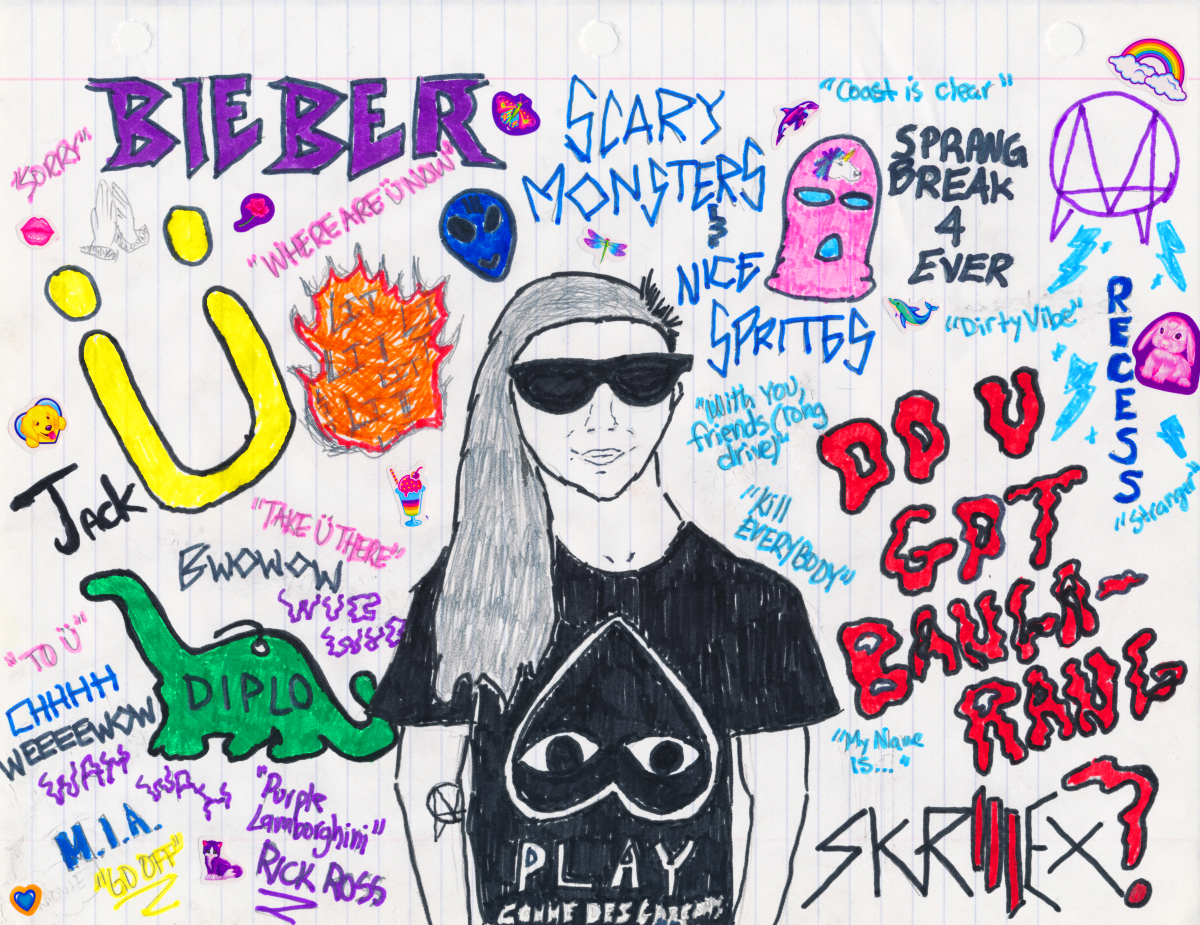Scary monsters… and what’s next for Skrillex
 Sam Podgurny
Sam PodgurnyIf you’ve been following Skrillex this year, your reaction to his output has probably been an exclamation of: “?!” The DJ and electronic music producer, aka Sonny Moore, hasn’t put out a solo album in two (soon to be three) years, creating a source of anxiety among those who regard him quasi-spiritually. Unfortunately, perusing Skrillex’s most recent work will leave you in no better position to predict his next steps — and judging by his latest production credits, not even the Oracle at Delphi could foresee the direction of his next album.
The first thing to understand about Skrillex is that, of the many things he is, music producer is chief among them. Roughly, this job description means he determines how a listener hears a song, deciding how the bass, treble, and other components of a track mix into a single sound — even when he completely invents the sounds getting mixed together. And when it comes to this job, he’s literally the best around. It may be incredibly hard to grasp what this means if you don’t produce music yourself, so just let the following testimonies from these reputable electronic music producers speak to Skrillex’s skill: Diplo, Zeds Dead, and Mr. Oizo. Samples of what these industry professionals think includes comments such as, “people think his sounds are the greatest… he’s the best drum producer, period,” or, “this guy’s tracks are the best of everything.” High praise coming from some of the genres best and brightest. Put differently, Skrillex is so good at the art of sound that Michael Bay (the loudest director in Hollywood) sought him out for Transformers 4 to work on sound design, effectively telling Moore to “go to town” (Bay also wanted to give Skrillex free reign on score, but was declined). If you still aren’t convinced of Skrillex’s multi-faceted production talents, just listen to this commercial he did for GStar (in 720p). Yep, he was that good three years ago. Notice how detailed and somehow large the sound is? It’s abstract, but it’s also Skrillex’s genius for sound production.
Some might argue in opposition: so what if the guy can make crazy, aggressive wobbles really well? My response: he actually does way more than that. Ever wonder why the drums on Justin Bieber’s “Sorry” are so next level, or how in god’s name anyone pulled off the flute sound in “Where Are Ü Now”? If so, Skrillex is your culprit. Second, and of broader significance, we live in a time when the line between music producer and musician has blurred. The future of music looks increasingly producer oriented and DIY — an aspiring vocalist can make their own instrumentals without the money for a band and studio, a rapper can do the same. All of this requires embracing the production of music as art itself and Skrillex is, in large part, responsible for showing people it’s possible to do this (commensurate to one’s ambitions). Diplo rightly said of Skrillex, “There is no precedent for what he has done, and can do.” Skrillex’s Mozart-esque skill may very well be matched by his outward influence, in time.
Check out our Gateway-curated playlist of some of Skrillex’s best cuts from the past few years
So what is Skrillex doing now that has warranted both the notorious nostalgia for older work, and new album cravings from fans? Collaborating. Skrillex currently exists in a gaseous state, filling up all corners of the music scene, but at the cost of retaining an identifiable core. This is the guy who, within a year, has produced for The Game and Justin Bieber in the same month, and M.I.A. and Rick Ross in another; remixed EDM up-and-comers GTA for Thanksgiving, then produced orchestral magic with Tennyson for Christmas. Minus a few exceptions, the fact is, collaborative Skrillex production is watered down. Contrasted with early, notorious Skrillex production — tracks that are guided 360 degrees by Moore’s penchant for sonic polemics, but are nonetheless (roughly) local to one genre — and you can’t help but be a little bit nostalgic, especially if you’re someone for whom the art of production is relevant.
While many disagree, Skrillex’s radical unpredictability is unquestionably fun, as a fan, to watch and hear. Yet, it’s hard not to feel some nostalgia for the older days of Skrillex, back when he was an industry hermit, single-handedly inventing a genre and reorganizing the possibilities of sound — all while using a couple of shitty, blown-out speakers as a studio. Don’t misunderstand, in his new “collaborative” phase, Skrillex has made some absolute magic (which, given his recent Billboard chart residencies, I suspect I might be choir-preaching); but the nostalgia for Skrillex’s solo work also makes sense. For those who crave aesthetic cohesion in a Skrillex album however, we’ll be left waiting, living under Defcon 1.




